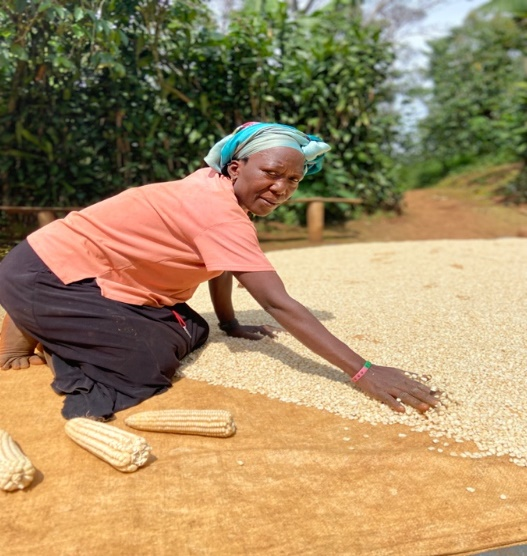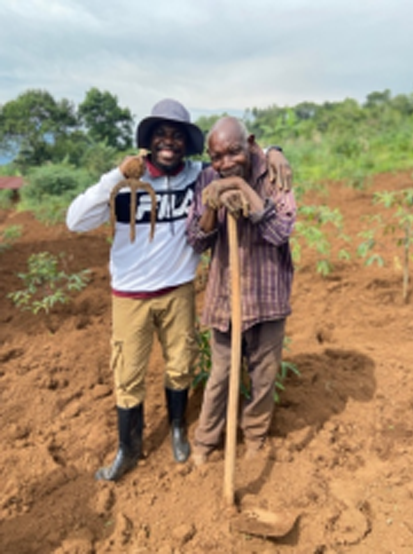| As part of the Great Lakes Accelerated Innovation Delivery Initiative Rapid Delivery Hub (AID-I GLR), funded by Feed The Future through the United States Agency for International Development (USAID) and led by the International Institute of Tropical Agriculture (IITA), Scientific Animation Without Borders (SAWBO), and Best Agricultural Investment Company (BAIC) collaborated in an initiative aimed to translate and disseminate agricultural scripts of SAWBO animations into various targeted languages in the Democratic Republic of Congo (DRC) that enhance advanced agronomic practices to agricultural cooperatives in the region. The aim of this collaboration was to provide agricultural animation resources to farmers with comprehensive training and practical guidance on best agricultural practices to improve their livelihood.
The emphasis of the first phase of this project, which kicked off in October 2023, was to establish a solid foundation to prepare farmer’s cooperatives to implement the advanced farming practices highlighted in the SAWBO animations in subsequent phases of the project.  The initial phase also established a foundation of translators to help place SAWBO animations into local langauges. Utilizing these translated videos, agricultural cooperatives will have access to educational material teaching best agricultural practices, including crop management, yield optimization, environmental sustainability, and resource efficiency. These materials have been subsequently used to provide practical training in the field using illustrative processes, enabling farmers to acquire concrete skills and learn different practices. With a view to empowerment, the focus was to develop leadership, communication, and networking skills, giving agricultural farmer’s cooperatives the tools they need to become influential players in their communities and in the regional agricultural market. The program also included interactive sessions designed to encourage creativity, innovation, and critical thinking through hands-on workshops, group sessions, and case studies. Participants, especially the youth, women, and girls will thus be empowered to cultivate an entrepreneurial spirit, develop innovative solutions to local agricultural challenges, and contribute to the transformation of the agricultural sector in their respective regions. |
||
|
||
| One of the major milestones of the collaboration was producing video animations in local languages spoken in the DRC. During this phase, BAIC identified translators to transcribe the scripts for voice over recordings. BAIC also collaborated with radio stations and audio/visual studios to facilitate the recording of these scripts in local languages. The 11 languages that were translated and recorded include French, Kinande, Lingala, Kiluba, Kitalinga, Kinyabwisha, Mashi, Kifuliru, Kirega, Kibembe, and Kihunde.
These translated animations cover a range of topics vital to agricultural success, such as survival gardening, post-harvest loss prevention, and climate-smart farming techniques. By providing practical guidance and training resources, SAWBO and BAIC aim to equip farmers with the skills needed to implement sustainable agricultural practices effectively. The 10 animations featured in this project are listed below by title: |
||
|
||
| “As the founder of BAIC, I am proud to acknowledge the significant strides we’ve made, despite encountering some obstacles during our journey. One of the major challenges we experienced was working with voice recording artists that have limited access to reasonable quality recording equipment and live in remote areas, however, moving forward we look to enable these resources and skills in our people to work with SAWBO towards more topics and more langauges,” notes Hilaire Muzibao. “I’m inspired by our team’s unwavering dedication to surmounting these hurdles and ensuring that we deliver truly impactful results. Our commitment to excellence remains steadfast as we continue to forge ahead in our mission.”
“Upon reflection of the achievements of the initial phase, we are pleased with the fact that we now have novel educational resources that were not available to our people prior to this project. These materials can be used for years to come and are critical to boost our private sector extension efforts as we build out a strong value chain,” added Muzibao. |




 Hilaire Muzibao poses with a farmer.
Hilaire Muzibao poses with a farmer.



